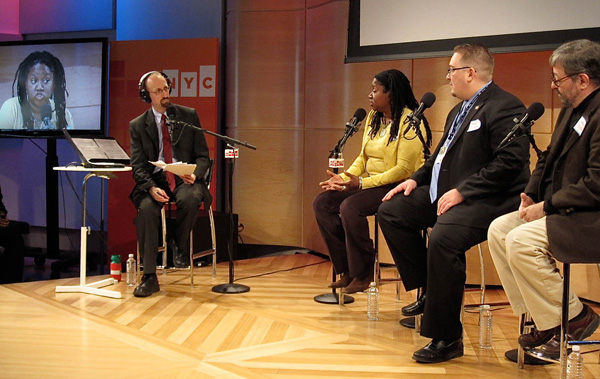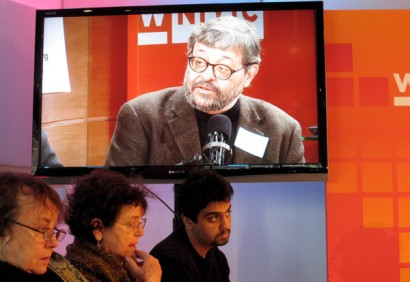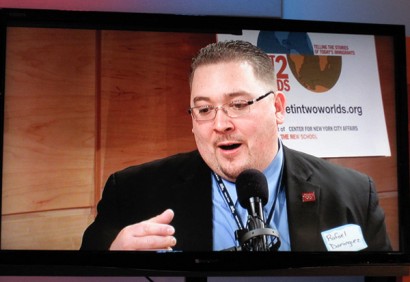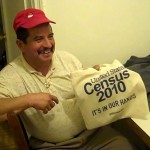
Stacey Cumberbatch, coordinator at the NYC 2010 Census Office, answers a question from Brian Lehrer. (Photos: Jocelyn Gonzales)
On Wednesday, as part of Feet in Two Worlds’ coverage of the 2010 Census, WNYC’s The Brian Lehrer Show hosted a live conversation on New Yorkers at risk of being undercounted. Annie Correal, a reporter for Feet in Two Worlds and El Diario/La Prensa, was at the event and recorded her impressions. (Press play below to listen to the event.)
[audio:http://audio.wnyc.org/bl/bl031010apod.mp3]Something unexpected happened at our event on WNYC’s The Brian Lehrer Show about the census: people laughed.
The census is the biggest number-crunching story of the year, and yet, amid the talk of statistics and the maps of hard-to-count neighborhoods, the panelists on the live panel organized by Feet in Two Worlds found time to show a little humor.
Angelo Falcón, chair of the Census Advisory Committee on the Hispanic Population, told listeners that when it comes to the census, the Hispanic community is receiving a positive message, focused on all the things they stand to gain by being counted and receiving more federal funding. But, he joked, he also told people to fill out their forms precisely because some anti-immigrant groups don’t want them to.

Latinos should take part in the Census to bust anti-immigrants' chops: Angelo Falcón, chair of a census advisory committee on Hispanics.
“There are a lot of people who don’t want you to sign the forms, so fill them out just to bust their chops!” Falcón said.
When Lehrer asked how you would say that in Spanish, Falcón shot back, “Busta de chops!”
Despite the collective good humor, the theme was serious. Lehrer reminded his listeners that historically, New York has had the lowest rate of response to the census in the nation, and that it has lost billions in federal funding as a result. His questions for the panelists were, “Why is it so hard to get New Yorkers to get people to send back their census forms?” And, as a corollary, “Why are immigrants so hard to count?”
Also on the panel were Rafael Dominguez, New York partnership coordinator for the U.S. Census Bureau New York Region, and Stacey Cumberbatch, coordinator at the NYC 2010 Census Office, who explained the factors that can make a place hard-to-count, from overcrowded housing or a lack of telephones to residents’ language isolation (a contentious term, we learned) and fear or distrust of the government. They described the effort underway to reach traditionally hard-to-count households, which revolves this year around community-based organizations.
Valeria Treves, executive director of New Immigrant Community Empowerment, Rong Xiaoqing, reporter for Sing Tao Daily, a Chinese-language newspaper, and Seema Agnani, executive director of Chhaya Community Development, all spoke about outreach efforts in their communities. Steve Romalewski, from CUNY’s Center for Urban Research, demonstrated how these organizations and others can use a mapping system he helped develop to understand communities and plan outreach efforts.

Rafael Dominguez, New York partnership coordinator for the U.S. Census Bureau in New York.
Lehrer quipped that it was “the most on-the-ground community organizing since Obama ran against Hillary Clinton”.
As a way of reminding his audience of the perennial difficulties in counting the population, Lehrer played a clip of a vintage Saturday Night Live skit featuring Christopher Walken, which the host dated to 1990. In it, a census enumerator knocks on Walken’s door, and asks him how many people live there.
“Oh boy, that’s a good question. I’m bad with numbers. Maybe eighty.”
When the census worker balks, he says, “Seems high, doesn’t it?” and adjusts: “Not eighty, how about four?”
The Feet in Two Worlds project on the Census is made possible thanks to the generous support of the 2010 Census Outreach Initiative Fund at The New York Community Trust and the Laurie M. Tisch Illumination Fund.




